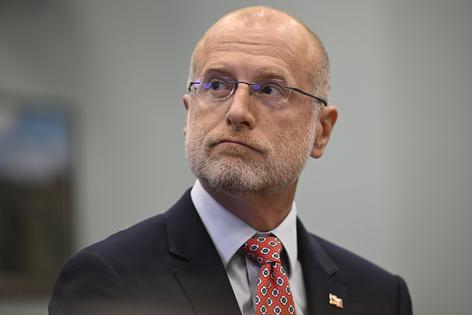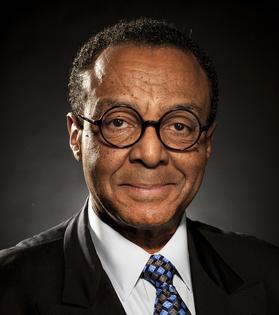Free Speech Under Fire Again Because We Need It
Remember when President Trump vigorously defended free speech — before he turned against it?
Remember how he sparked cheers when his second inauguration speech grandly promised to “immediately stop all government censorship and bring back free speech to America?”
“Never again will the immense power of the state be weaponized to persecute political opponents,” Trump continued.
That was then. Fast forward to the shocking assassination of his prominent ally, conservative activist Charlie Kirk in Utah.
Days after Kirk was murdered, Vice President JD Vance sat in as the host of Kirk's podcast, joined by Stephen Miller, deputy White House chief of staff and the architect of many of the Trump administration's most notorious policies. The two men made it clear they blamed the assassination on a conspiracy of "the left."
"(W)e have to talk about this incredibly destructive movement of left-wing extremism that has grown up over the last few years," Vance said, and "... talk about how to dismantle that."
He added, "We're going to go after the NGO network that foments, facilitates and engages in violence."
To elaborate on the Trump administration's intentions, Miller said, "We are going to use every resource we have at the Department of Justice, Homeland Security and throughout this government to identify, disrupt, dismantle and destroy these networks and make America safe again for the American people."
What did Miller mean by "these networks"? I'm not aware of any network or conspiracy involved in Kirk's assassination or the attempts on Trump's life. Indeed, as Miller carried on, it seemed what he had in mind was suppressing legal political speech, albeit viewed through the prism of his own persecution complex.
"The organized doxing campaigns, the organized riots, the organized street violence, the organized campaigns of dehumanization, vilification, posting people's addresses, combining that with messaging that's designed to trigger incite violence and the actual organized cells that carry out and facilitate the violence, it is a vast domestic terror movement."
Does this sound to you like Team Trump is out to trample all over constitutional rights in pursuit of their political enemies? It does to me.
It also fits with the sentiments of Attorney General Pam Bondi, who said, before she thought better of it, the Justice Department would “absolutely target you, go after you, if you are targeting anyone with hate speech.”
That declaration arched many eyebrows as we tried to decipher what she meant, since numerous court decisions have found “hate speech,” loathsome as it may be, is still, by itself and unaccompanied by illegal actions, protected by the First Amendment.
Bondi clarified that she meant the administration would be on the lookout for people who encourage violence.
Yet when ABC reporter Jonathan Karl asked President Trump what he thought of Bondi's clarification, he snapped: “She’ll probably go after people like you because you treat me so unfairly. It’s hate. You have a lot of hate in your heart."
Apparently deeming this not outrageous enough, Trump added, "Your company paid me $16 million for a form of hate speech. So, maybe they'll have to go after you."
Trump was referring to ABC's settlement of a libel case over how "This Week" anchor George Stephanopoulos had characterized the civil verdict that had found Trump liable for sexual assault. He used the term "rape" instead; ABC settled the case rather than fighting it in court.
That's a far cry from hate speech, but Trump's message was clearly delivered: Constitutional rights are under siege again.
But none of this garnered as much attention — and, for many of us, alarm — as Disney-owned ABC’s decision on Wednesday to pull “Jimmy Kimmel Live!” off the air indefinitely, in response to backlash over, yes, a political joke.
“We had some new lows over the weekend,” Kimmel said in part, “with the MAGA gang desperately trying to characterize this kid who murdered Charlie Kirk as anything other than one of them and doing everything they can to score political points from it.”
Whether you laughed or not, the joke was well within the usual boundaries of political comedy on late-night TV, a grand old American medium of entertainment, particularly for those of us who follow the news a lot.
But that just whetted the appetite for retribution.
Brendan Carr, the Trump loyalist who chairs the Federal Communications Commission, made a veiled threat on right-wing influencer Benny Johnson's podcast that television executives immediately understood.
"We can do this the easy way or the hard way," Carr said. "These companies can find ways to change conduct to take action on Kimmel or, you know, there's going to be additional work for the FCC ahead."
Nexstar and Sinclair Broadcast Group, the first and second largest TV station operators in the U.S., reacted with haste, announcing that they would pre-empt Kimmel's show on their ABC affiliates. ABC read the writing on the wall and suspended the show.
It might be churlish to point out that Nexstar's speed in carrying out Carr's wishes had something to do with its very important business before the FCC. Last month, it entered an agreement to buy Tegna, another television station owner/operator, for $6.2 billion. That would put it over the FCC's ownership cap, but with the right inducements, Trump and Carr have the ability to remove that obstacle.
Carr sounds proud of himself, and how could he not when media moguls are lining up to kiss his ring to keep their deals happening? Meanwhile, his view of the FCC’s mandate to protect the public airwaves sounds like what the late writer and civil libertarian Nat Hentoff described as “Free speech for me but not for thee.”
I did not agree with Kirk’s right-wing approach to politics but, to paraphrase an old slogan, I will defend to the death his right to preach it. At least he strongly defended the need to foster dialogue with his adversaries, which is what free speech should be all about, not silencing your adversary by law or otherwise.
For now, the endless debates over free speech and hate speech are necessary to protect our free society. We need them not to give good publicity to the powerful but to educate and inform citizens and help our democracy to work.
========
(E-mail Clarence Page at clarence47page@gmail.com.)
©2025 Tribune Content Agency. Distributed by Tribune Content Agency, LLC.
(c) 2025 CLARENCE PAGE DISTRIBUTED BY TRIBUNE MEDIA SERVICES, INC.


























Comments